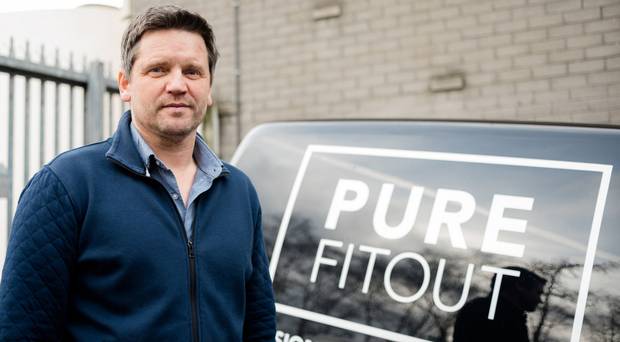Construction companies have been suffering, especially in the months leading up to Brexit.
However, one fit out business proves that there is still demand, expanding its operations from Ireland into Britain.
Ronan Higham, founder of Pure Fitout, talks about what makes his business work and stresses the need for government to help ease the industry’s skills shortage.
How did Pure Fitout come to be and what is its USP?
Being in the fit out industry for over two decades gave me a huge amount of experience to draw on. I’ve worked on many projects – both in the UK and abroad – I realised there were a lot of things that could be improved.
From the beginning, Pure Fitout’s mission was to make clients the centre of our business. In our experience, there was a lack of transparency between contractor and client, a model which appeared quite prevalent in construction in general. For Pure Fitout, this model of transparency would be one of the central tenets of the business.
A key decision then was to bring as many of the operations under Pure Fitout’s control as possible and to build a one-stop shop model for clients. With so many delays caused by third-party suppliers, we decided to bring joinery and metal fabrication in-house, to become self-sufficient and take control of our own destiny as much as possible.
This helps us ensure that we meet deadline and produce a high quality of work to our clients.
What are the biggest challenges of running the business?
Fit out is a very demanding industry with exceptionally tight delivery timelines and high-quality delivery, so many of our employees are under significant pressure.
It’s important that Pure Fitout employees enjoy coming to work every day. Through company culture and team spirit, we continually target high retention rates. We pride ourselves on creating an atmosphere where everyone feels supported and where individual successes are celebrated.
An additional challenge, which is not unique to the construction industry, is the issue of good cash flow with strong financial management. We’ve always been financially prudent on all projects. We have a strong emphasis on financial oversight and governance to reduce risk as much as possible.
How has it been expanding to Britain?
We’ve put in a lot of work into securing new projects in mainland Britain and it’s really starting to take off. Our new UK head of business development, Amanda Allen, was appointed in January this year. She brings vast experience within the industry to identify and pin down new business opportunities throughout England, Scotland and Wales.
There are some very exciting projects that we are on the cusp of announcing, including several firsts for Pure Fitout.
What has been your favourite project so far with the company?
Although we have delivered some exciting projects over the last couple of years, including the award-winning restoration of the Stella Theatre, my personal favourite has to be our very first project, Five Guys in Belfast.
It represented a very steep learning curve for the company and I was extremely delighted to hand it over to the client on time and within budget. It was a watershed moment for us and we have since delivered the fit out for every Five Guys in Ireland with more in the pipeline.
How did you secure funding for the company?
We initially received backing from a private investor that allowed us to complete our first projects.
Since that initial seed investment, we were quick to successfully secure a strong set of projects and have invested everything back into the company to improve its capabilities and reach its full potential.
What are your goals as a business over the next five years?
Driving the highest-quality delivery within agreed timelines to ensure client satisfaction and keep the business growing steadily. In the three years Pure Fitout has been in existence, we have observed a year-on-year growth rate of 50% and we are targeted to continue growth at similar levels.
We have a strong, technically-skilled workforce combined and we aim to continue to be our client’s first choice for fit out.
What would you say to small business owners worrying about the decline of construction?
While there have been a lot of negative headlines around construction in the last 12 months, we believe there are multiple opportunities that can be tapped into during this time of uncertainty.
With a strong focus on high-quality delivery, a focus on our clients and good contingency planning, we can succeed. Other than that, there isn’t much more anyone can do.
There will always be uncertainty, regardless of the industry and the time.
How would you tackle the problem of a lack of industry apprentices?
It’s well-known that there is a skills shortage throughout the industry, especially among young people. High demand for labour and a limited workforce makes it more difficult for businesses to competitively tender for projects.
We’re committed to invest in the next generation of workers and at present have seven apprentices based in our workshops, all of whom are making a positive impact on our business. Their improvement in such a short period of time is hugely encouraging.
This will only improve as more and more young people are exposed to the benefits that a career in construction can offer. I believe companies such as ours have a key role to play in the future of the industry and it’s one that I am proud to support.
“High demand for labour and a limited workforce makes it more difficult for businesses to competitively tender for projects”
This is one area the government bodies could help; training of trades must be re-established to ensure we can provide the skilled workforce needed to take this industry to the next level.
It’s an exciting industry to be in, working with the highly talented designers and architects to deliver some of the most beautiful, exceptional projects in the sector.





